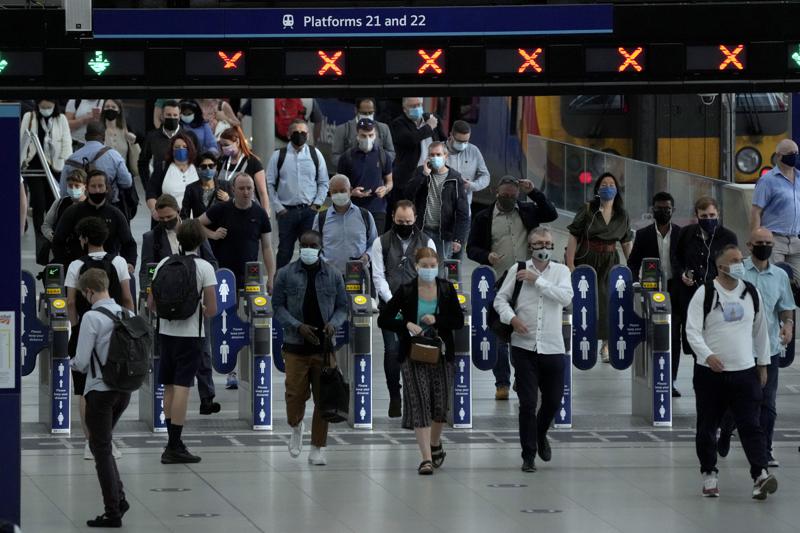For many, the mask is a common courtesy or a sensible precaution. For others, it’s an imposition, a daily irritation. The face mask — a highly charged source of debate, confusion, and anger around the world during the coronavirus pandemic — is now dividing people as the crisis eases.
Britain is bracing for acrimony on Monday, when the government lifts a legal requirement to wear face coverings in most indoor settings, including shops, trains, buses, and subways. Donning a mask in many places will stop being an order and become a request.
Advertisement
Already, people are split about how to respond.
“I’m glad,” said London café owner Hatice Kucuk. “I don’t think they really help much.” But Lucy Heath, a filmmaker, said she would prefer to see masks remain mandatory on the subway and in supermarkets. “I just think vulnerable people will feel that they don’t want to venture out,” she said.
The end of many pandemic restrictions next week — once touted in British newspapers as “freedom day” — comes as the U.K. faces soaring coronavirus cases and rising deaths, despite an inoculation program that has given two-thirds of adults both doses of vaccine.
This week Britain recorded more than 40,000 cases in one day for the first time in six months. Globally, the World Health Organization says cases and deaths are climbing after a period of decline, spurred by the more contagious delta variant. Last week there were nearly 3 million new infections and more than 55,000 lives lost around the world.
Against that backdrop, British politicians’ talk of freedom has been replaced with words of caution. “This pandemic is not over,” Prime Minister Boris Johnson said this week. “We cannot simply revert instantly from Monday the 19th of July to life as it was before COVID.”
So while people no longer have to wear masks, they’re being told that they should.
The government says it “expects and recommends” masks to be worn by workers and customers in crowded, enclosed spaces such as shops. London’s mayor says masks will continue to be required on the city’s public transit system, and the National Health Service will insist on them in hospitals. And while the rules are changing in England, masks will still be mandatory in Scotland and Wales, which make their own health regulations.
Opposition politicians and some doctors have urged the government not to remove the mask mandate, while businesses and unions worry the change from mandatory to optional is a recipe for chaos.
Britain is not alone in grappling with masks. In recent months, Israel has reopened businesses, schools and event venues, lifting nearly all restrictions after it inoculated some 85% of its adults. Now cases are rising again, and authorities have reimposed a rule requiring people to wear masks indoors, as the country scrambles to contain the delta variant.
In the United States, the Centers for Disease Control and Prevention says fully vaccinated people don’t need to wear masks in most settings, in contrast to the WHO, which advises them to cover up. Some U.S. states and cities are trying to decide what to do as cases rise again.
In many East Asian countries, it was common even before the pandemic for people to wear masks when sick or on high-pollution days. There is little in the way of an anti-mask movement.
“The face mask is such a minimal object — this small piece of fabric, it’s a very low-tech device. But it’s become imbued with so much symbolic power,” said Deborah Lupton, professor at the Center for Social Research in Health at Australia’s University of New South Wales and co-author of the book “The Face Mask in COVID Times.”
A mask against COVID-19 “is an object which can offer some degree of certainty and protection in this very, very chaotic and uncertain and constantly changing risk environment,” she said. “I think for that reason alone, it has incredible power and significance.”
(With AP inputs)











